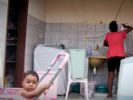Eye For Film >> Movies >> Housemaids (2012) Film Review
The rough’n’ready feel of Housemaids (Doméstica) is a result of its concept, for which director Gabriel Mascaro tasked seven children across five different Brazilian cities with filming their live-in housekeepers for a week, and consequently edited their footage into a slim but coherent volume. (If, as production notes suggest, the concept wasn’t any more complicated than that, then Mascaro’s directing and especially his scriptwriting credits are problematic if not unethical.)
The pattern is simple enough: each of the children introduces themselves to camera, approaching their housekeepers for their permission to film as they go about their daily work. One such child gets her maid to sign a release form; another advises, “carry on talking, pretend the camera isn’t there”. As we learn, the time with which each of these housekeepers has been at their current position varies: Helena has been with Juju’s family for 16 years, Vanusa with Claudeniro’s for 17, while Gracinha has been Alana’s family maid for only three years. The latter, however, also admits that she’s “spent more time here than I have with my mother… sometimes I feel homesick; when I’m alone, I feel sad”.

At 11.54pm, Alana films Gracinha asleep, propped up against the sofa as if she has literally worked herself to such a state. Soon after, Gracinha reveals that soon before becoming a maid her only son was murdered; she does this while folding sheets – preparing, in fact, her own bed – in some absurdly diversionary ritual. Indeed, all of the housekeepers who feature here speak of either personal sorrow and/or of how their circumstances were inherited (ie, their mothers were also housemaids, etc). One such made, Flavia, tells in horrific detail of how she miscarried triplets as a result of domestic abuse.
As much as one might disagree with housekeeping as a profession – or view it as a symptom of deeper malaises – it’s difficult to condemn the rapport that builds up between homeowner and servant over many years. Juju’s mother Lucie, for instance, sheds tears upon recalling the birth of her maid Helena’s daughter, Fernandinha. Thickening the plot further – or hinting at a more systemic context – Flavia says that she has no complaints about her job, since her employer is also a housemaid whose “boss makes demands of her”. The subsequent mental picture that this revelation conjures, of a social fabric built entirely around servitude, is absurd.
These are specifically class problems, though they manifest themselves in both racial and gender terms. While for example there is a clear divide, on the whole, between black servants and white homeowners, the presence here of Sergio, who became a housekeeper after his wife left him due to economic hardship (and who is the only male in a film whose title is gender-specific), demonstrates the patriarchal implications of private property and the division of labour it conditions.
Reviewed on: 30 Apr 2013















